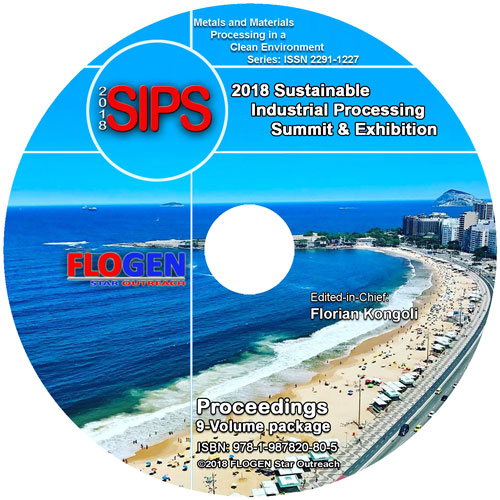2018-Sustainable Industrial Processing Summit
SIPS2018
Volume 6. New and Advanced Materials and Technologies
| Editors: | F. Kongoli, F. Marquis, P. Chen, T. Prikhna, N. Chikhradze |
| Publisher: | Flogen Star OUTREACH |
| Publication date: | 23 December 2018 |
| Pages: | 392 pages |
| ISBN: | 978-1-987820-92-8 |
| ISSN: | 2291-1227 (Metals and Materials Processing in a Clean Environment Series) |

CD shopping page
Dehydriding Properties of Mg-Al Alloys Prepared by Hydriding Combustion Synthesis and Mechanical Milling
Liquan Li1; Yunfeng Zhu1;1NANJING TECH UNIVERSITY, Nanjing, China;
Type of Paper: Regular
Id Paper: 214
Topic: 43
Abstract:
Faced with the energy crisis and environmental pollution, hydrogen has drawn more and more attention as a new, clean, and renewable energy source for sustainable development. Metal hydride is viewed as one of the most ideal hydrogen storage means [1]. With respect to the metal hydrides, magnesium hydride (MgH<sub>2</sub>) is one of the most attractive candidates for reversible hydrogen storage. Nevertheless, its poor hydrogen sorption kinetics and unfavorable thermodynamic stability impede its commercial use [2]. Alloying of Al is a promising choice to lower the thermodynamic stability of MgH<sub>2</sub>. It has been proven that the in-situ Al (denoted as Al*) generated in the hydriding of Mg-Al alloys is better than as-received Al in enhancing the hydrogen sorption performances of Mg, because this kind of Al* is oxide-free, possesses high chemical activity, and uniformly distributes in the samples [3]. Moreover, using Mg-Al alloys instead of Mg means that the hydrogen desorption reaction pathway of MgH<sub>2</sub> would alter and result in the destabilization of MgH<sub>2</sub>. In this work, we intend to fabricate MgH<sub>2</sub>-Al* composites with the hydrogenation of Mg-Al alloys by the process of hydriding combustion synthesis (HCS, which has been acknowledged as an effective way to fabricate Mg based hydrogen storage alloys [4]) following mechanical milling (MM) and to study the effect of Al* on the dehydriding properties of Mg-based hydrogen storage alloys. DSC analysis showed that the peak temperature of dehydriding of MgH<sub>2</sub> was reduced by 298 K and by 284 K when 20 at% Al was added in HCS process and in MM process, respectively. Isothermal dehydriding at 573 K for 3 h demonstrated that it took 81 min for the HCS+MM-MgH<sub>2</sub> to desorb 50% of hydrogen, while only 24 min was required for HCS+MM-MgH<sub>2</sub>-20 at% Al, in which Al was added in HCS. The SEM/EDS measurements demonstrated that Al generated in situ from the hydriding of Al<sub>12</sub>Mg<sub>17</sub> was uniformly distributed, which would make it more beneficial for Al to perform high thermal conductivity. The apparent activation energy for dehydriding of MgH<sub>2</sub> was reduced from 144.3 kJ/mol for the HCS+MM-MgH<sub>2</sub> to 118.8 kJ/mol for HCS+MM-MgH<sub>2</sub>-10 at% Al when Al was added in HCS.
Keywords:
Alternative energy sources; New and advanced materials; New and advanced technology; storage and use;References:
[1] L. Schlapbach, A. Zuttel, Nature 414 (2001) 353-358.[2] H.H. Cheng, Y. Chen, W.P. Sun, H.R. Lou, Y.Q. Liu, Q. Qi, J.M. Zhang, J.J. Liu, K. Yan, H.M. Jin, Y. Zhang, S.Y. Yang, J. Alloy Compd. 704 (2017) 769-775.
[3] Y.L. Zhou, Y.L. Zhu, Y.F. Zhu, L.Q. Li, J. Alloy Compd. 628 (2015) 257-262.
[4] D.M. Liu, Y.F. Zhu, L.Q. Li,, Int. J. Hydrogen Energy 32 (2007) 2455-2460.